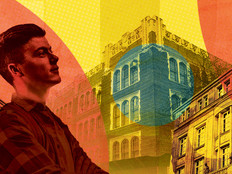The Future of Libraries: Harvard Students Are Thinking Outside the Box
To say that Harvard students are thinking outside the box when it comes to the future of libraries would be an understatement. We all know that e-books and digital content are part of libraries’ evolution, but what about “electric campfires,” Wi-Fi “cold spots” and geospatial searching?
That is the kind of thinking going on in the Library Test Kitchen, part of an advanced seminar at Harvard’s Graduate School of Design. Faculty director Jeffrey Schnapp is driven to save physical libraries. While books and other content can easily be made digital, the true value of libraries is rooted in community, interaction and learning. Maximizing a library’s potential means finding new ways to inspire and educate students. As Schnapp told the Boston Globe, “We have a unique opportunity to expand, not contract, the function of libraries.”
Schnapp says his ideal library would be an inclusive “beehive,” with room for all kinds of activity, and the Wi-Fi Cold Spot would have a natural home among noisy meeting areas and open, participatory research projects.
The ethos of the Library Test Kitchen is to build libraries that mirror the communities they inhabit, where the page and the screen jostle in sometimes random, sometimes coordinated ways; where creation and rest, clamor and quiet move through public spaces in balletic chaos — and where library patrons find wonder, serendipity, and that endangered virtue, what [instructor Ben] Brady calls “a moment of pause.”
A look at some of the projects students are working on gives you an idea of how broadly they are thinking. Here are a few of the most interesting ideas to come out of GSD Seminar 09125.
Electric Campfire
Jenny Hong realized that when library users needed to power up devices like notebooks and tablets, they were confined to outlets scattered throughout the building. She designed the Electric Campfire — a “cubical table arrayed on each side with wireless power outlets,” according to the Harvard Gazette. The intent is to encourage social interaction with other users. The term “library voice” may soon be a thing of the past.
Spatial Googling
When you know what to search, it’s easy to find a book in the library. But Stacy Morton proposed an innovative way to search a library’s archives, or even an entire city. The idea is that a user can save keyword searches and then receive notifications if they pass near an object that has been tagged with relevant terms.
Wi-Fi Cold Spot
Created by Ben Brady, the Wi-Fi Cold Spot “provides a haven of disconnectedness in a sea of connectivity,” according to Fast Company. Libraries are key to providing online access to those without a home Internet connection. But for most of America’s college students, an area without Wi-Fi is hard to find. This little room is designed to be a den of productivity.
Check out some of the current projects on the Library Test Kitchen website.








